|
That’s right! It’s back! After the massive success of our first Dating Games in July we were inundated with emails asking us when the next one was. We wouldn’t want to disappoint you. Especially when you look so nice today, so, on Thursday October 18th Science London will hosting ‘The Dating Games – Science of Compatibility – Mark Two’! The format will be remaining pretty much the same (few tweaks) so some of you will know the drill already but for those of you that do not; here is a low down for the evening plans… Science London is seeking 20 guys and 20 girls who are straight, single and aged between 20-34 to come and participate in our speed dating experiment. So if you are open-minded, up for a laugh, looking for someone special and curious to learn about the science behind the dating game then this is the event for you! |
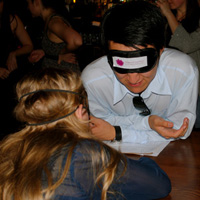
|
Introduction
When you arrive you’ll be greeted by one of the cheerful Science London crew and handed a drink to help calm any nerves (we’re so good to you). Once everyone has arrived we’ll be breaking the ice with a short burst of humour from the love guru that is Dr Steve Cross (co-creator of Science Showoff and Bright Club). What he doesn’t know about dating isn’t worth knowing!
Method
You’ll now find yourself in a room full of potential romance. The air will be thick with pheromones and an eagerness to impress… so naturally for the first round of dates we will be plunging you all into complete darkness and giving you 3 minutes to talk to all of your possible soul mates with no idea what they look like. Accents are sexy right? Then, we’ll turn on the lights and let you grab a drink before we plough ahead with round two where you will be able to look at each of your prospective love matches but with no talking allowed. It’s all in the eye contact. After you have ogled and chatted to everyone you’ll be given the chance to select your favourites from the dark and light before our behind-the-scene experts whisk away your scorecards and examine the data.
Discussion
Whilst we are crunching the numbers you’ll be given the opportunity to quiz Dr. Simon Watt, an evolutionary biologist who knows all about what it is that attracts animals to one another. We ain’t nothing but mammals after all…
Results
The Science London data team will then report back to announce any successful matches. Should we find a couple (or couples) who have been attracted to each other’s dark conversation and light looks we will foot the bill for their first date.
Conclusion
Will this novel dating approach help us to find true love? Honestly, we do not know. We got a few matches at the first games in July… either way we can have a lot of fun finding out together
When you purchase a ticket to this event you will be asked to complete a short personality profile and submit a headshot of yourself. This information is needed before the date night so please be sure to send it to us by 12 October
Also please note that when you sign up to this event you will also be participating in a real experiment into the science of dating. There will be journalists at this event who may wish to talk to you about your experience; you will have the option to share your information or decline.
Date: Thursday 18th of October 2012
Time: Doors open at 7pm (dates starting promptly at 7:30pm)
Place: Bethnal Green Working Men’s Club, 42-46 Pollard Row, London, E2 6NB [gmap]
Cost: £8 (including a drink on arrival) from Event Brite or using the form below.
Please note when buying your ticket we have had to separate sales by gender to ensure a 50/50 split so make sure you pick the right ticket. We will not issue refunds for buying the wrong type of ticket.
We’ve been invited back to Drink Shop & Do, and this time it’s for the entire day.
|
On Sunday the 14th of October Science London will be bringing Space (and the science that entails) to Kings Cross. We are still working on the full details but we will have crafty things, activities, talks, films and real scientists on the day to help you learn and play all about the inky blackness beyond our blue planet.
Plus, in preparation for the day, Drink, Shop & Do are holding a special planet-making ‘Do’ on Thursday 11th October. Pop along from 7pm and build a planet to adorn the cafe on Space Day. Date: Sunday 14th October 2012 |
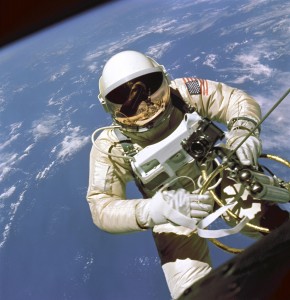 Image courtesy of NASA |
Schedule:
Upstairs:
10:30 to 18:00 – Space themed origami, film and competition for the best space themed fact
12:00 – Rocket building workshop with Dr Simon Foster from Imperial College London
13:30 – Rocket building workshop with Dr Simon Foster from Imperial College London
15:00 – Rocket building workshop with Dr Simon Foster from Imperial College London
16:30 – Rocket building workshop with Dr Simon Foster from Imperial College London
There are limited places in the workshops, to book your space email rockets@science-london.com with your name,number of people and preferred time.
Downstairs:
18:00 to 20:00 – Chat with our space specialists. Want to learn more about space? Have a burning question? Come talk to some of the brightest minds in the field with Kate Gray (AKA Space Kate) hosting Louisa Preston, Marek Kukula and Alex Salam
Dr Louisa Preston is a Geologist by training but an Astrobiologist by choice who spends her time thinking up ways to find life on Mars. She looks at microbes that live in the most extreme places on Earth such as the geysers of Iceland and red acidic rivers of Rio Tinto in Spain, to practice ways of finding life on other planets. She did her PhD at Imperial College London, spent 3 years in Canada running analogue space missions to the Moon at Western University, and is now a Postdoctoral Research Associate at The Open University.
Dr Marek Kukula is the Public Astronomer at the Royal Observatory Greenwich. Marek completed his doctorate in Radio Astronomy at Jodrell Bank Observatory in Cheshire and carried out research into black holes and distant galaxies at a variety of astronomy centres, including the University of Edinburgh and the Space Telescope Science Institute in Baltimore, home of the NASA/ESA Hubble Space Telescope.
Dr Alex Salam works with with NASA’s Behavioural Health and Performance Element on human adaptation to long duration space missions and NASA’s Habitable Volume Community of Practice on psychological issues relating to the design of deep space habitats. Previously he researched the effects of extreme isolation and confinement and stress on the human immune system, behavioural health, and sleep at Concordia Station on the high Antarctic plateau.
|
The perfect team should be filled with selfless players all working together under great leadership towards a collective goal, right? Well – maybe not necessarily. Because it turns out that that there are examples from nature where animals – ants, birds and fish – can accomplish spectacular things as a ‘team’ but do so without a leader and just by going about with their own business.
This phenomena – known as emergent behaviour – has been observed in human setups ranging from giant games of pong to Barcelona’s footballing style and has been the subject of much interest by the academic community in recent years. Dr Hannah Fry from University College London will be talking about how by harnessing what we know about the patterns created by emergence, we could help to improve our society, with everything from crime to healthcare. |
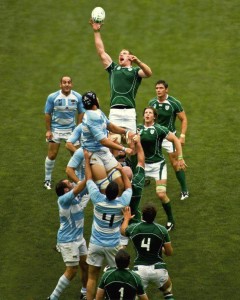 Paul O’Connell – Ireland Rugby by Paolo Camera |
Date: Wednesday 10th October 2012
Time: 7pm, for a 7.30pm start
Place: Upstairs at The Lamb, 92 Lambs Conduit Street, WC1N 3LZ [gmap]
Cost: Free
Fruit flies: The key to a longer life?
|
Thanks to improvements in our understanding of health, we can all expect to live well into old age. While long life has benefits, it also means we are likely to suffer from the diseases of ageing. What if we could understand the biology of ageing, could we develop treatments that address its causes and in so doing, treat all of the diseases of ageing?
Remarkably, recent research has found genetic and dietary treatments that extend healthy lifespan in lab animals. What’s more, the same treatments appear to work in very different organisms from worms to mice, indicating that these findings could be relevant to humans. Dr Matthew Piper will give an overview of the current state of knowledge of ageing research, with a focus on his field of expertise: flies and their food. |
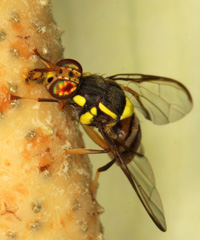 A Rod-horn fruit fly by Gbohne |
Matthew graduated with a PhD in Biochemistry and Molecular Genetics from the University of New South Wales, Sydney. He then moved to Delft, in the Netherlands, to work in an industrial fermentation lab where they developed yeast to make high value scents and flavour compounds, such as the rose scent in perfumes. In 2003, he moved to UCL in the UK to work on ageing, using the fruitfly as a model organism. In 2010 he started his own lab with funding from the Royal Society and the BBSRC. His interest lies in how we can use nutrition to improve lifelong health in to old age.
Date: Wednesday 28th November 2012
Time: 7pm, for a 7.30pm start
Place: Upstairs at The Lamb, 92 Lambs Conduit Street, WC1N 3LZ [gmap]
Cost: Free
|
You may not know it, but algae is undoubtedly the world’s most important organism. Scientists estimate that, rather vitally for all of life, it produces between 70 and 80 percent of the oxygen in the atmosphere. Thanks, algae!
On Saturday 20th October, Science London will be making an appearance at the Bloomsbury Festival to show you what it’s like being algae. Forget angels and pin-heads, we will be conducting a craft-based investigation to see how much algae can fit into a waterdrop. Expect hands-on activities and probably more algae facts than you can handle. Date: Saturday 20th October 2012 |
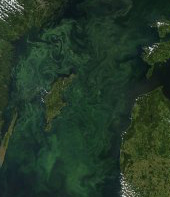 Summer Bloom in the Baltic Sea courtesy of NASA |
Pictures from the event van be seen here:
http://www.flickr.com/photos/sciencelondon/sets/72157632872808416/
Click here to leave a comment about this event
This site is powered by WordPress.
Science London was part of the British Science Association
